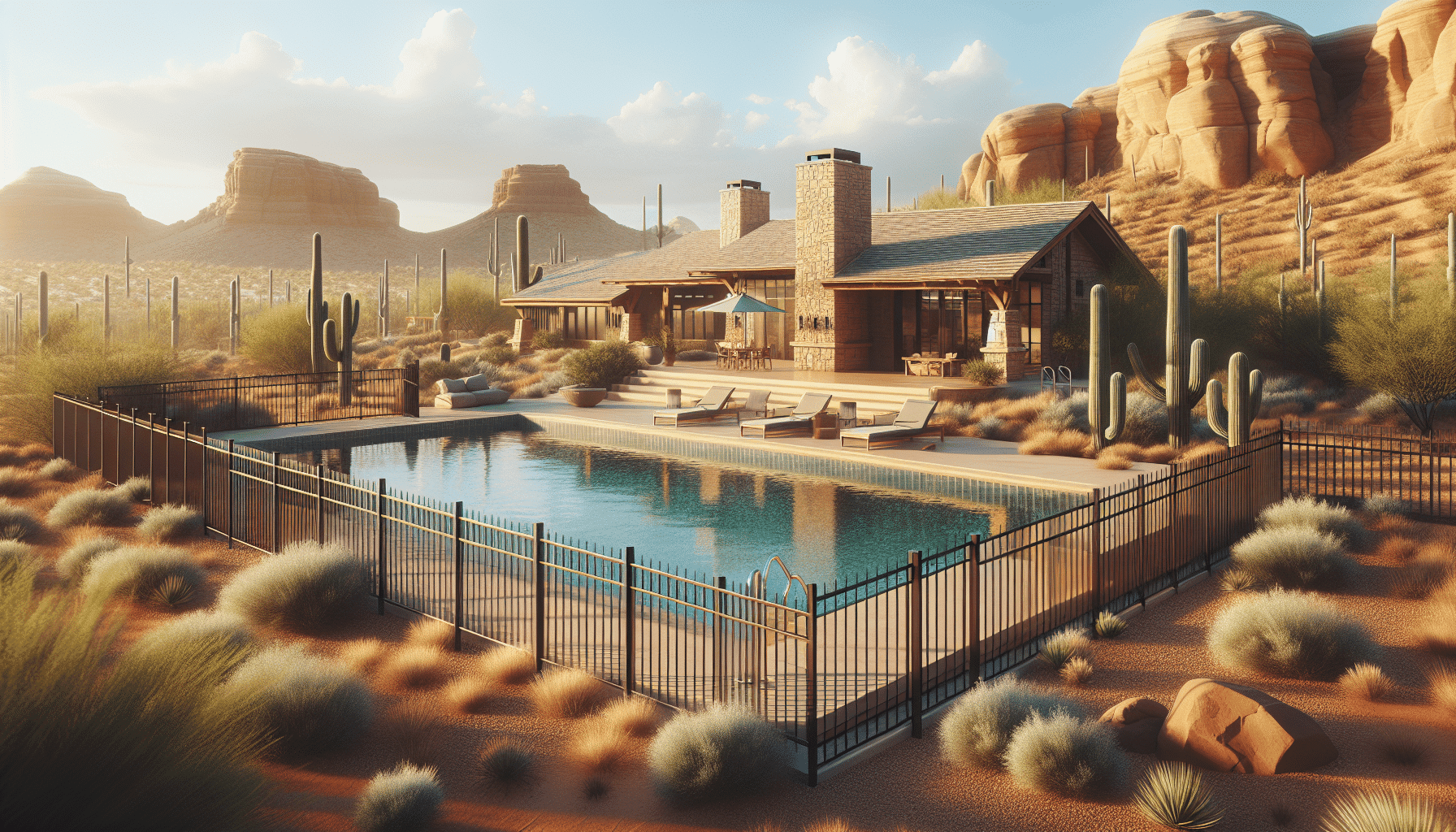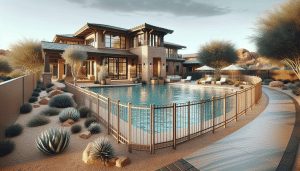Owning a pool is one of life’s greatest joys, especially under the warm Arizona sun. However, it also brings a responsibility to ensure safety for your family and guests. At Pool Safety Fencing, we understand the challenges homeowners face in meeting legal safety standards. This guide will walk you through the essential steps to safeguard your pool with compliant fencing, offering peace of mind for everyone.
Contents
- 1 Understanding Legal Standards for Pool Fencing
- 2 Choosing the Right Fence Material
- 3 DIY Installation vs. Hiring Professionals
- 4 Gate Requirements and Maintenance
- 5 Height and Structure Specifications
- 6 Regular Inspection and Compliance
- 7 Handling Emergencies: Safety Beyond the Fence
- 8 The Role of Alarm Systems and Advanced Safety Options
- 9 Environmental Considerations for Your Pool Fence
- 10 Let Us Help Safeguard Your Pool
Understanding Legal Standards for Pool Fencing
Navigating the legal landscape of pool fencing might seem daunting at first glance, but we’re here to simplify this process. Each state, and sometimes each city, has specific requirements for pool fencing. It’s crucial to stay informed about the regulations that apply to your property. Start by checking your local zoning ordinances and building codes, which will outline the necessary fencing height, gate requirements, and materials. Failure to comply can lead to fines or worse, so it’s worth investing the time to understand these laws.
Moreover, these legal standards are not just bureaucratic hurdles; they play a significant role in ensuring safety. Having the right knowledge empowers you to make the best decisions for your pool’s safety measures. Whether you’re installing a new fence or upgrading an existing one, being proactive about legal standards can help you avoid costly mistakes down the line.
Choosing the Right Fence Material
With legal standards in mind, choosing the right material for your pool fence is your next priority. The material you choose should not only meet legal obligations but also complement your home’s aesthetic. We offer various options including wood, mesh, aluminum, and glass, each with their own benefits and drawbacks.
Wood fences provide a natural look but require regular maintenance. Mesh fences are great for flexibility and ease of installation. Aluminum offers a sleek, modern look and is both durable and low-maintenance. Glass fences, meanwhile, offer an unobstructed view of your pool and are perfect for modern homes, though they can be more expensive. Each material has its qualities and should be selected based on personal preference and practical parameters, such as the local climate.
DIY Installation vs. Hiring Professionals
Now that you’ve selected your fencing material, the question arises whether to tackle the installation process yourself or hire professionals. Do-it-yourself (DIY) might seem appealing due to potential cost savings. However, it comes with its own set of challenges. Improper installation can lead to safety hazards and violations of local codes.
On the other hand, hiring a professional service like ours ensures the job is done correctly and swiftly. We possess the knowledge and tools needed to install a fence that complies with all safety regulations, saving you time and worry. Our team can provide you with a seamless experience, ensuring every detail is handled meticulously.
Gate Requirements and Maintenance
A critical part of any pool fence is the gate. It’s not just an entry point; it’s a line of defense. Regulations often specify that gates must be self-closing and self-latching, with latches positioned at a certain height to prevent young children from accessing the pool unsupervised.
Regular maintenance of these gates is equally important. Over time, gates can sag or malfunction, undermining safety. Routine checks can prevent these issues, ensuring your gate remains effective. This proactive approach is essential for sustaining a secure environment around your pool, keeping everyone safe and sound.
Height and Structure Specifications
Height is another pivotal factor in pool fencing regulations. Most jurisdictions require pool fences to be at least four feet tall, but it’s imperative to verify the specific height for your locale. The structure must also be constructed in a way that prevents climbing, often specified by rules regarding the spacing of bars or panels.
Adhering to these guidelines ensures that your fence serves its primary purpose: to prevent accidental pool access by children or animals. Attention to both height and structure is a vital step in maintaining compliance and enhancing safety around your pool.
Regular Inspection and Compliance
Even after your pool fence is installed, the journey to ensure safety doesn’t end there. Regular inspections are fundamental; they catch early signs of wear and tear or changes in conditions that might compromise safety. We recommend scheduling a professional inspection at regular intervals to ensure ongoing compliance.
This proactive approach will give you peace of mind, knowing that your fence consistently meets safety standards. Additionally, staying vigilant with inspections can prevent costly repairs by addressing potential issues before they escalate.
Handling Emergencies: Safety Beyond the Fence
While a secure fence is a crucial component of pool safety, it’s also essential to think beyond fencing. Having safety equipment like life rings or rescue hooks readily available near your pool can be invaluable during emergencies.
Teaching household members, especially kids, about pool safety rules and emergency procedures is another layer of protection. Conduct periodic safety drills to ensure everyone knows how to act swiftly in case of an emergency. A well-informed household is a safer household.
The Role of Alarm Systems and Advanced Safety Options
For homeowners seeking added peace of mind, consider complementing your pool fence with alarm systems. These can include door alarms that alert you when someone accesses the pool area, or pool alarms that notify you of unexpected water movements.
Advanced safety options, like security cameras or smart pool covers, offer further reassurance. These technologies can be integrated seamlessly with your existing safety measures, creating a comprehensive safety net protecting your pool area.
Environmental Considerations for Your Pool Fence
Think about the environment when planning your pool fence. In addition to aesthetics and legal standards, consider how weather conditions like intense sun or wind might impact your material choice. In our service area, climate features prominently in making the best decisions for durable, sustainable fences.
Furthermore, explore eco-friendly materials and practices wherever possible. Sustainability can blend into your home alongside safety and elegance, creating a space that’s kind to its environment without compromising security.
Let Us Help Safeguard Your Pool
We at Pool Safety Fencing are ready to assist you in achieving a safe, legally compliant pool area. Whether you need a consultation or a full installation, contact us by phone at 480-771-8026 or request a free quote.




